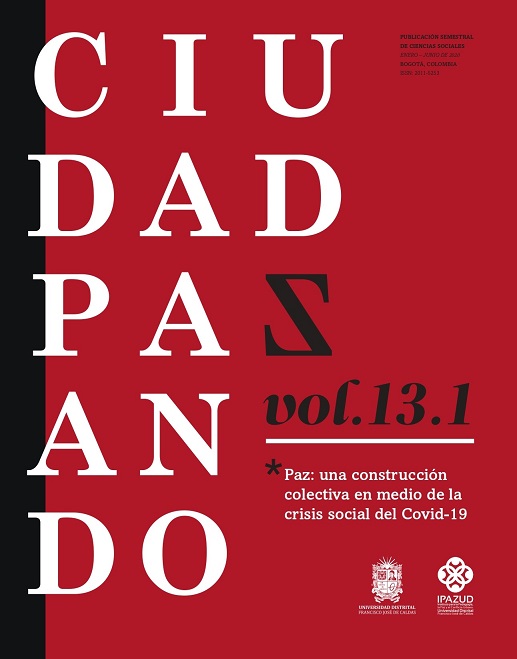DOI:
https://doi.org/10.14483/2422278X.13925Published:
2020-06-30Issue:
Vol. 13 No. 1 (2020): enero-junio. Paz: una construcción colectiva en medio de la crisis social del Covid-19Section:
Voces otrasLa democracia radical (agonista) como posible horizonte de intersubjetividad
Radical democracy (agonist) as possible intersubjectivity horizon
Keywords:
democracia, hegemonía, política, lo político, teoría política (es).Keywords:
democracy, hegemony, politics, political, political theory (en).Downloads
Abstract (es)
A lo largo del texto se procurará, en primer lugar, hacer un seguimiento exhaustivo a los planteamientos de Hegel respecto al reconocimiento que deviene en un horizonte de intersubjetividad, lo anterior tomando como base las premisas que esgrime en su texto Filosofía real, desarrollado durante el periodo de Jena; teniendo en cuenta lo anterior, el tratamiento de la segunda parte del texto consiste en evidenciar la relación intersubjetiva existente en la política agonista o democracia adversarial que propone Chantal Mouffe a lo largo de todos sus textos, apoyando este horizonte intersubjetivo en los planteamientos hegelianos mencionados anteriormente. El fin último del texto es entablar un diálogo entre la concepción de poder —que en Mouffe se entiende en términos gramscianos de hegemonía— y la intersubjetividad que media las relaciones entre los sujetos, con el fin de ver la imprescindible confluencia de estos para un funcionamiento del Estado en relación con el pueblo.
Abstract (en)
Throughout the text an exhaustive follow-up will be sought to Hegel approaches, in respect to the recognition that becomes an intersubjectivity horizon, this taking in count as basis the premises he wields on the text Real Philosophy, which is developed during Jena’s period. Given the above, the second part of the text treatment consists on evidence the existing intersubjective relationship in antagonist politics or adversarial democracy proposed by Chantal Mouffe, supporting this intersubjective horizon on Hegelian approaches mentioned before. The final purpose of the text is to establish a dialogue between power conception—which in Mouffe is understood in hegemonic Gramscian terms—and the intersubjectivity in the middle of subject relationships, that with the end of seeing the indispensable confluence of this subjects to a state functioning in relationship with the people.
References
Habermas, J. (1998). Teoría de la acción comunicativa. Trotta.
Habermas, J. (2010). Facticidad y validez: sobre el derecho y el estado democrático de derecho en términos de teoría del discurso. Trotta.
Hegel, G. (1984). Filosofía real (J. M. Ripalda, ed. y trad.). Fondo de Cultura Económica.
Mouffe, C. (1999). El retorno de lo político. Comunidad, ciudadanía, pluralismo, democracia radical. Paidós.
Mouffe, C. (2011). En torno a lo político. Fondo de Cultura Económica.
Mouffe, C. (2014). Agonística. Pensar el mundo políticamente. Fondo de Cultura Económica.
Mouffe, C. y Laclau, E. (2015). Hegemonía y estrategia socialista: hacia una radicalización de la democracia. Fondo de Cultura Económica.
Rawls, J. (2015). Liberalismo político. Fondo de Cultura Económica.
Schmitt, C. (2014). El concepto de lo político. Alianza.
Trías, E. (1981). El lenguaje del perdón. Un ensayo sobre Hegel. Anagrama.
How to Cite
APA
ACM
ACS
ABNT
Chicago
Harvard
IEEE
MLA
Turabian
Vancouver
Download Citation
License
Copyright (c) 2020 Ciudad Paz-Ando

This work is licensed under a Creative Commons Attribution-NonCommercial-ShareAlike 4.0 International License.
The Ciudad Paz-ando Journal (RCP) is an open access publication, without economic charges for authors or readers, whose biannual publications are made under the terms of the Creative Commons Attribution - Non-commercial - Share the same License (CC-BY-NC -SA 2.5 CO), with which others may distribute, remix, retouch, and create from the work in a non-commercial way, as long as they give credit and license their new creations under the same conditions.
The copyright holder is Ciudad Paz-ando journal, retaining all rights without restrictions, respecting the terms of the license regarding the consultation, download and distribution of the material.
When the work or any of its elements are in the public domain according to the applicable current law, this situation will not be affected by the license.
Likewise, we encourage authors to deposit their contributions in other institutional and thematic repositories, with the certainty that culture and knowledge is a good for all and for all.

